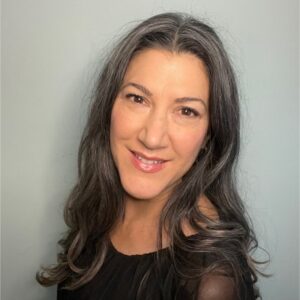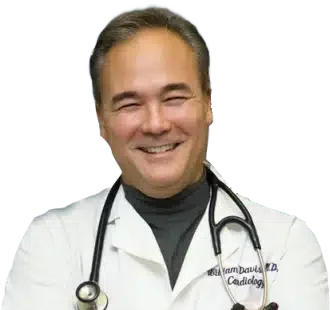FMCA graduates are united in their goal to make a positive impact on individuals and their communities through health coaching. But there are many different paths to success for a health coach after graduation from FMCA’s Health Coach Certification Program.
Elizabeth Kelly is an FMCA graduate who is also a member of FMCA’s Alumni Program. Follow along to learn more about her journey.
“FMCA prepares us at a whole other level.”
Elizabeth Kelly, FMCA Graduate
Alumni Elizabeth Kelly is currently working as a health coach in Pennsylvania. Not only does she work with two functional medicine clinics, but she is also working with private clients, speaking across her community, and being featured on local radio. She is an active member of the FMCA Alumni Program and credits FMCA and the AP program helping her create a successful coaching career.
In our Alumni Feature interview, Elizabeth shares her tips and tricks to setting up a coaching business using free resources. She also shares how alumni program networking and services have helped her not only grow her business but also find both of her coaching positions at clinics. Elizabeth shares her experience with the Connect, Collaborate, and Build Workshops and the Business Building Content and Business Mentorship opportunities available through the program.
Most importantly, Elizabeth is a member of the overall FMCA alumni community. She is one of the many alumni who share their experiences, advice, and support to other graduates as they make the world a healthier place.
Elizabeth Kelly is an FMCA Graduate for Life.
Watch the Interview
Watch Elizabeth Kelly’s Alumni Feature interview with FMCA

Elizabeth received her certification from the Functional Medicine Coaching Academy in August 2022. She currently works as a remote health coach for AlphaOmega Wellness in Greenwood, Indiana, and Functional Health of Lancaster in Lancaster, Pennsylvania. She is also the founder and owner of Grey Gardens Health Coaching, LLC.
Elizabeth is a firm believer in the functional medicine approach and has seen the results of its applied principles in her healing journey. Her personal health issues have cultivated compassion and empathy for her clients. She understands their struggles because she has been there. She loves leading clients to find the answers that were within them all along.
In addition to her health coaching certificate, Elizabeth holds a Bachelor of Music from Susquehanna University and a Master of Art from Edinboro University. She has enjoyed a diverse career, including co-hosting a morning Christian radio show, acting in commercials, television, and on stage, creating and selling art, and leading a worship band at her church. She loves spending time with her children and grandson, being in nature, hiking, biking, and kayaking with her husband, gardening, cooking, reading, and learning new things. She resides in Erie, PA with her husband, Paul.
Join the FMCA Alumni Program
Explore how you can take your community, your career, and your coaching to the next level in the FMCA Alumni Program. We offer a wide collection of resources and opportunities in the FMCA Alumni Program to help you GROW as a Functional Medicine Certified Health Coach!
You’re not alone! FMCA is committed to your success, and that doesn’t end after graduation.
Transcript
Kerri: Great. Okay, well, thank you for meeting with me today, Elizabeth. I really appreciate your time, taking out of…I know, as always, it’s usually a very busy day for you.
Elizabeth: It is my pleasure to be here. Thanks, Kerri.
Kerri: Yeah. So, I just had a couple of questions for you today just to, sort of, get a perspective from you on your experience in the alumni program, and where you are today in your career as a health coach, and where you would like to go. So, tell me about your career as a health coach. Where are you at with things right now?
Elizabeth: Well, right now, I work for two functional medicine clinics as a contracted coach. So, I needed to have my own business set up. So, I worked on that for the first few months following graduation, and I worked with my local small business development center.
So, a lot of communities have support for entrepreneurs. And I highly encourage, once you launch, that you get connected or even, as you’re in school, in hindsight, I probably could have been doing some of that while I was in school too, taking the course.
But one of my jobs came through networking. A previous cohort had a job, and she was looking to move out of her position. And she recommended me to the clinic that she was working for, so I interviewed with them and got that job. And then, as I said, the other clinic is based in Pennsylvania. So, they went on the page, the Find A Coach page, and looked for coaches in Pennsylvania and contacted me. They reached out to me to interview for the job. So, I work remotely for a clinic in Indianapolis and a clinic in Lancaster, Pennsylvania. And I am in Erie, Pennsylvania, so it’s awesome to be able to have that remote option because it doesn’t limit me to just my community.
Kerri: Mm-hmm, exactly.
Elizabeth: In addition, I did join a local holistic practitioner collective. I also interview on local radio stations when I’m able to. I work in my community. I speak at senior centers when I can. My client load is growing, so a lot of that is limited now to what I’m able to do, but I do still have my own clients, my private clients in my practice as well.
And then in addition, as, kind of, a supplement that I thought would marry well with the coaching business is I’m in the process of becoming… Well, I am a lifestyle specialist with an all-natural organic food delivery company. So, it’s kind of like direct sales but just being able to provide my clients with an option to get whole quality, nutritious food.
Kerri: Wonderful. Wow, it sounds like you really diversified yourself and leaned into your community. Mm-hmm.
Elizabeth: Yeah, I think diversifying is the key. When you’re first starting out, you really don’t know. We have an idea in mind of what we think it’s going to look like, but there’s so many options out there and so many different ways that you can make a living as a health coach that I think it’s important to diversify at the beginning because you just, kind of, see where life leads you in that way.
Kerri: Exactly. And for those who are still struggling to maybe find a niche, that diversification is probably helpful because it gives you access to lots of different coaching experiences. So, that’s maybe where you can also, sort of, hone in and find your ideal client or clientele that you would like to work with.
Elizabeth: So true.
Kerri: Yeah. Well, and thank you for providing that really great advice of letting grads know and new health coaches that you can lean into your community and access those resources through just marketing, going to events, speaking engagements. But also, I love what you said about… And I know you’ve mentioned this before in other calls, that you utilize the access of a business development center, which really sounds like it kickstarted your career.
Elizabeth: Yeah. I mean, they were really instrumental. They helped me build my website. They helped me come up with a marketing plan. They put me in contact with a free legal clinic. So, I was able to work with them to develop my coaching agreement. I mean, they’ve just been extremely helpful. It would have been really hard to do it without them.
Kerri: Yeah, and I imagine a lot of those resources are free or at least nominal, right?
Elizabeth: Yes. So, the small business development center is free, and the legal clinic, they did everything on the legal end. Because I chose to go with an LLC, I just had to pay for the LLC. And so if you go to a lawyer, you’re going to pay a lot of money to set up that LLC. If you can find a college or a university that has pre-law students, oftentimes they have a free legal clinic, and you can set that up at a minimal cost.
Kerri: Oh, that’s wonderful advice. Thank you for sharing that great little piece of advice for future health coaches. I think that’s so instrumental in getting started because I think that’s really what holds a lot of people up, right?
Elizabeth: It is. It feels very overwhelming when you’re starting out. It’s like you have to do all of these things but, yeah, it is support out there for entrepreneurs.
Kerri: And the benefit, I guess, of also going to the legal clinic is that they probably also took a quick look at your client agreement, I’m imagining. Is that right?
Elizabeth: Oh, that’s it. That’s all we did. Yes, yes. Well, no, we did set up the LLC. But, yes, they did look at my client agreement. They rewrote it for me. And even brought up things that I hadn’t really considered. And so that was another aspect of that free legal clinic.
Kerri: Exactly, yeah.
Elizabeth: It’s legal students who are putting it together, but it’s being reviewed by an actual lawyer who is maybe their professor or works with the school.
Kerri: Wonderful. How did your student experience at FMCA support you for your career?
Elizabeth: Oh, my word. How long do we have?
Kerri: As long as you feel you need.
Elizabeth: First of all, I just want to say that I feel extremely blessed that I chose this organization, that I chose FMCA to be the one that supplied my certification because I didn’t know it at the time but I really do believe that it is the gold standard.
In talking with other coaches in different, like, Facebook communities or working in the functional medicine community, I feel like FMCA, they prepare us at a whole ‘nother level. When I am working with these practitioners and I go on the chart and I see some of the tests and things, I know exactly what they’re doing because of my training with FMCA.
When a client asks me a question about a test, I’m like, “I know what they’re testing. I know what that test is for and I can explain it to them.” And I can explain the different parts of things that they’re looking at just because of all of the functional medicine training that we had. I mean, we’re not practitioners, but it’s great to know and understand when you work for a practitioner because the clients are going to have questions. And I credit my training to that.
Yes, that is a key element of it and even more importantly is the coaching aspect. The emphasis on being a coach and not an expert, the emphasis on client-led, on positive psychology, and motivational interview, and mind-body medicine has made me an incredible coach. And it’s not because of me, it’s my training. And I’m so grateful, so grateful that I chose FMCA because it truly is, I think, the best training for functional medicine coaches out there.
Kerri: Thank you so much for that feedback, Elizabeth. I can really feel that in your heart. And you are an excellent coach. I’ve seen you coach, but I love just your perspective on the whole thing, and I know you’re out there going out in the world and you’re changing lives one client at a time. So, thank you for representing FMCA and for just doing what you love to do.
Elizabeth: Well, it’s my pleasure, and thank you for doing what you do, because it’s so important. And the quality of the program is because of all the dedication of the people behind the scenes. And we are so grateful. Those of us who have been through the program are so grateful for the support that you offer.
I’m still in contact with my course facilitator, and I consider her a mentor. And just the connections that I’ve made with other coaches, we really are a united community, and I love that. I love that about FMCA. I just love that we collaborate together. I’ve seen so many coaches collaborate. I’ve seen course facilitators collaborating with coaches. I’ve seen Dr. Sandi and Elise collaborating with coaches. And when I say a community, I really mean it. We’re all there to support one another, and I love it.
One key element of my training at FMCA is you need to understand where I came from and what my background was. I was in the arts. I was a singer. I was in radio. I had my own art business. And so I didn’t have any medical training or background at all, only my lived experience and what I had been through.
And so what I want to tell you is that you don’t have to have any special type of training or degree. FMCA takes care of that for you. All you really need is to have a heart to help people. Coaching is available to anyone who has a heart to help people.
Kerri: With the FMC alumni program, I’d love to know how did it help you and what was your experience like.
Elizabeth: Yeah, I’m so grateful that I joined the alumni program because having the experience in the Coaching Advancement Initiative, being able to go to the CCBs and the Graduate Resource Center, having all those modules and the FMCA health coaching certification course access and also the Facebook community, all of those things have been so helpful in my journey as a health coach.
The Coaching Advancement Initiative gave me the opportunity to coach clients when it was difficult for me to get clients. And so I was still coaching. I was getting that experience of coaching clients. I was getting practical experience as well like the technical aspects of it, setting up the virtual visits, doing charting, doing scheduling, coaching basics, staying sharpened with my coaching basics, and then also being able to fine-tune and coaching things like the elimination diet, more specific things. So, I’m really grateful for that experience.
I love popping in when I can on the Connect, Collaborate and Build Workshops. Those have been extremely helpful. Also, the coach mentoring workshops with Margarita Tarragon. She is fantastic.
Kerri: She really is.
Elizabeth: Yes, she has helped me through some difficult challenges, things that you don’t… There’s always going to be a new experience when you’re coaching that you’ve never encountered before, and that’s just a great place to be able to go to talk it out with other coaches, to get other ideas and inspiration or to even just work through your own stuff to become a better coach. So, those have been extremely valuable for me.
Kerri: Oh, that’s so good to hear.
Elizabeth: Yeah, and the Graduate Resource Center, the job board. When I first launched, I went there all the time looking for jobs, applying for jobs through the job board. And right away, I put up my profile page as soon as I graduated, and I’m so glad that I did because one of the clinics that I work for, she actually saw my profile page on the website and that’s how I got interviewed for the job and ultimately got the job. And also although I haven’t participated in it but the referral program I think is an amazing aspect of the alumni program. So, I hope that answers your question.
Kerri: Yes. Yes, very well. Thank you. It sounds like you’ve really utilized all aspects of the alumni program, which is really great. And I love hearing that, even though you’re working as a coach now, you’re still continuing to access those resources and popping in when you can. And it’s just so wonderful, especially when you’re working in your own practice or in another practice, and you’ve got clients and you need to, sort of, have that, maybe a quick perspective or coaching perspective from, as you said, a mentor or another coach you can lean on and the support of your coaching community. So, that’s wonderful. Awesome.
Thank you so much, Elizabeth. I really appreciate your time today. And, yeah, we are so blessed to be able to support you guys as well. And we’ll make sure to pass along your feedback to the team because that’s such a nice thing to hear. And you’re right. It is a very strong community, and that’s why we’re all here. And we love what we do. So, thank you again for your time today. Really appreciate it.
Elizabeth: You are so welcome. Thank you.
Our Latest Blogs
-

Protein 101: The Health Coach’s Guide
Read Full Article: Protein 101: The Health Coach’s Guide -

Women’s Health and the Vaginal Microbiome: A Probiotic Breakthrough
Read Full Article: Women’s Health and the Vaginal Microbiome: A Probiotic Breakthrough -

Forever Chemicals 101: What Health Coaches Need To Know
Read Full Article: Forever Chemicals 101: What Health Coaches Need To Know

